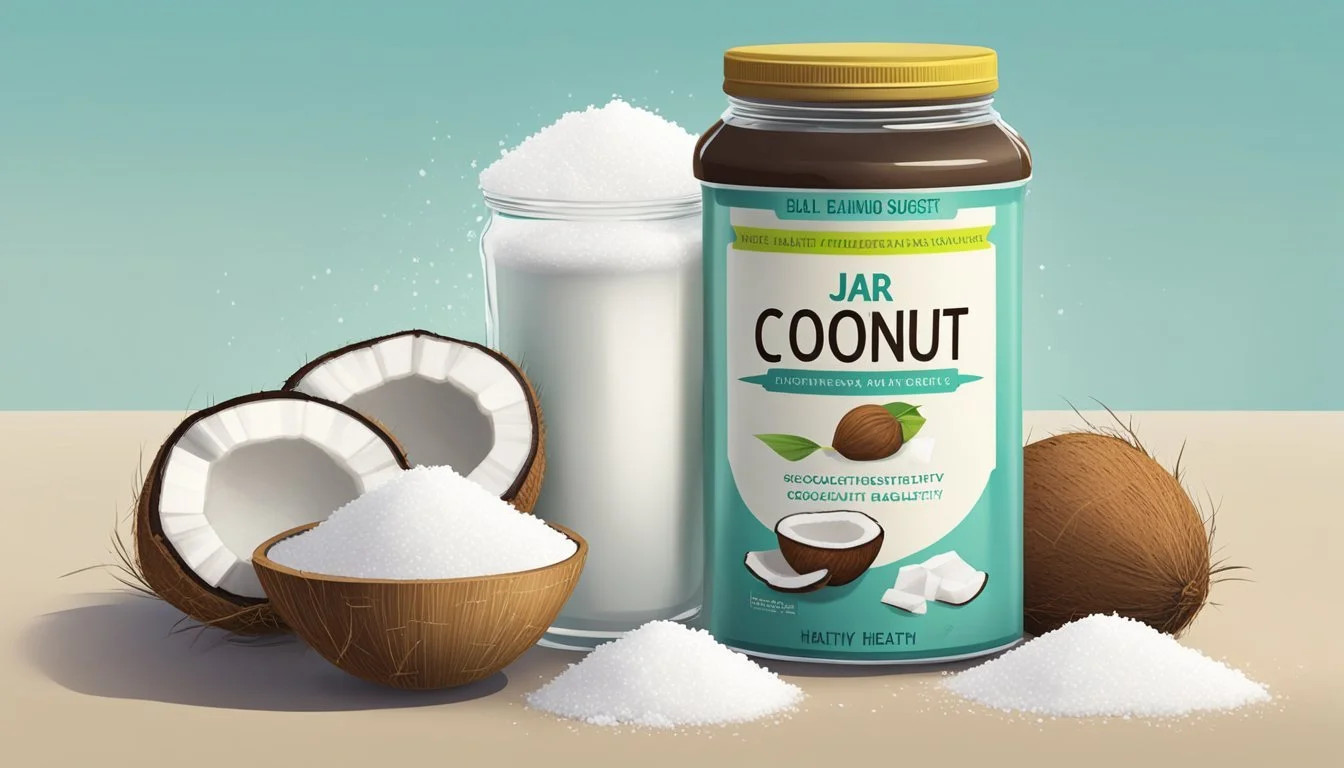Is Coconut Nectar a Healthy Alternative to Sugar?
Debunking Myths and Revealing Facts
Coconut nectar has been gaining popularity as a sweetener among those seeking healthier alternatives to refined sugar. Extracted from the sap of coconut blossoms, coconut nectar is often presented as a more natural and nutrient-rich option. Its lower glycemic index compared to regular table sugar suggests that it may have less of an impact on blood sugar levels, which is particularly attractive to individuals with specific dietary goals or those managing diabetes.
In evaluating the health aspects of coconut nectar, it's essential to consider its composition and how it compares to other sweeteners. While coconut nectar contains trace amounts of vitamins and minerals, the nutritional benefits might be modest due to the small serving sizes typically consumed. The fact that coconut nectar offers some nutrients does not offset the presence of calories and carbohydrates, which are comparable to those found in regular sugar.
The debate over whether coconut nectar is a healthier alternative continues, as it does share similarities with other natural sweeteners like raw honey or pure maple syrup. However, its potential advantage lies in its inulin content, a type of soluble fiber that may help modulate blood glucose levels. Despite these nuances, consumers should remain mindful of their overall sugar intake, as excessive consumption of any sweetener can contribute to health concerns.
Understanding Coconut Nectar
Coconut nectar is a natural sweetener derived from the sap of the coconut palm tree, positioning itself as an alternative to traditional sugars. It is often considered due to its nutritional composition and lower glycemic index.
Origins and Production
The origins of coconut nectar trace back to the coconut palm tree, specifically its flowers. Local farmers collect the sap by making incisions into the flower buds or the tree itself. This sap, without further refinement, is heated at low temperatures to remove water content, resulting in the thick syrup known as coconut nectar.
Nutritional Profile
Coconut nectar contains a notable amount of nutrients compared to regular table sugar. It provides minerals like iron, magnesium, and vitamin C. One of its most mentioned benefits is its glycemic index (GI), which at a lower score indicates a slower release of glucose into the bloodstream.
Nutrient Value in Coconut Nectar Calories 20 per teaspoon Iron Present Magnesium Present Vitamin C Present Glycemic Index Around 35
Comparison to Other Sweeteners
When comparing coconut nectar to other sweeteners, it has similar calorie content but generally a lower glycemic index. For instance, table sugar has a GI of around 60, while coconut sugar, derived from the same sap, has a GI of 54.
Honey: 21 calories per teaspoon, higher GI
Maple syrup: 52 calories per tablespoon, higher GI
Agave nectar: 20 calories per teaspoon, can have a low or high GI depending on processing
Brown rice syrup: 25 calories per teaspoon, higher GI
Coconut nectar's lower glycemic impact along with its nutrient content makes it an attractive option for those seeking natural sugar alternatives.
Health Implications
Evaluating the health implications of coconut nectar involves considering its glycemic index, impact on blood sugar levels, potential health benefits, and risks. This alternative sweetener has gained attention for its nutritional profile compared to regular sugar.
Glycemic Index
The glycemic index (GI) is a measure that ranks food and beverages based on how they affect blood sugar levels. Coconut nectar boasts a lower GI compared to regular table sugar. For reference, glucose has a GI of 100, while table sugar (sucrose) hovers around 60. Coconut sugar, which is similar to coconut nectar, is reported to have a GI of approximately 54.
Impact on Blood Sugar Levels
The impact of coconut nectar on blood sugar levels is noteworthy due to its fructose content, although the amount may vary. Fructose does not directly raise blood sugar levels as glucose does, thus potentially resulting in a slower and lower rise in blood sugar levels post-consumption. However, it's important to note that excessive intake of fructose can lead to health issues, including obesity and heart disease.
Potential Health Benefits
Coconut nectar contains inulin, a type of dietary fiber that helps regulate blood sugar spikes and could be linked to a lower risk of diabetes. Additionally, it may offer antioxidants, which protect the body from oxidative stress. It is important to emphasize that while coconut nectar can provide these benefits, moderation is key to avoid negative health effects.
Risks and Considerations
While coconut nectar has potential benefits, consumers must consider the risks. Overconsumption can contribute to increased calorie intake and, therefore, weight gain. Moreover, for individuals with diabetes, careful monitoring of any sweetener intake, including coconut nectar, is essential to maintain target blood sugar levels. It may be a more health-conscious choice than other sweeteners, but it is not a risk-free substitute and should be used judiciously.
Nutritional Content and Benefits
Coconut nectar, positioned as a healthier sweetener, offers a modest range of vitamins and minerals in addition to its natural sweetness, making it a subject of interest for individuals seeking alternatives to refined sugar.
Vitamins and Minerals
Coconut nectar contains a variety of minerals including potassium, which helps regulate blood pressure. It has traces of iron, which is pivotal for oxygen transport in the blood, and calcium, essential for bone health. Small amounts of zinc, necessary for immune function, and magnesium, key for muscle function and energy production, are also present. Coconut nectar provides some vitamin C, known for its antioxidant properties and role in collagen synthesis.
Potassium: Supports muscle and nerve function
Iron: Essential for blood oxygenation
Zinc: Boosts the immune system
Calcium: Strengthens bones and teeth
Magnesium: Facilitates numerous biochemical reactions
Vitamin C: Aids in repair of all body tissues
Antioxidant Properties
Antioxidants are substances that can prevent or slow damage to cells caused by free radicals. Coconut nectar contains polyphenols, which are plant-based compounds with antioxidant properties. Polyphenols can reduce inflammation and improve overall health.
Polyphenols: Help to mitigate oxidative stress
Dietary Fiber
Coconut nectar is a source of prebiotic fiber in the form of inulin. This type of dietary fiber enhances gastrointestinal health by promoting beneficial gut bacteria. Prebiotics are essential for a balanced gut microbiome and have been linked to improved digestion and immune function.
Prebiotic Fiber (Inulin): Supports gut health and digestion
Role in a Balanced Diet
When discussing coconut nectar within the context of a balanced diet, it is crucial to consider its impact on daily sugar intake and how it should be incorporated.
Daily Sugar Intake Recommendations
According to health authorities like the World Health Organization (WHO), adults should limit their intake of free sugars to less than 10% of their total energy intake. Free sugars include monosaccharides and disaccharides added to foods and sugars naturally present in honey, syrups, fruit juices, and fruit juice concentrates. For better health, further reduction to below 5% is advised.
Recommendations for adults: 25 grams (6 teaspoons) for a further reduction
Normally advised limit: 50 grams (12 teaspoons)
Coconut nectar, a natural sweetener derived from the sap of coconut palm trees, contains slightly lower rates of glucose and fructose than regular sugar, which can help when aiming for these sugar intake targets.
Incorporating Coconut Nectar Moderately
While coconut nectar is often marketed as a healthier alternative with a lower glycemic index than table sugar, suggesting a less significant impact on blood sugar levels, it's still a form of sugar and must be consumed in moderation as part of a healthy diet.
It is key for individuals to:
Understand that moderation is essential, regardless of the sugar type
Not exceed daily sugar intake recommendations, even with sugar alternatives like coconut nectar
Include coconut nectar as part of a nutrient-dense diet rather than focusing on it as a primary sweetening agent
Including coconut nectar in the diet should be balanced with the overall nutritional value of the foods consumed, aiming for a variety of healthy foods that provide essential nutrients.
Comparison with Other Sweeteners
In comparing coconut nectar to other sweeteners, it is crucial to examine their origins and nutritional profiles, specifically looking at calorie content and the type of sugar they contain.
Natural Versus Processed Sweeteners
Natural sweeteners are derived directly from plants without significant processing. Here's how coconut nectar, a natural sweetener, compares to others in terms of processing:
Honey and maple syrup are similar to coconut nectar in that they are extracted directly from natural sources and undergo minimal processing.
Agave nectar also falls into the natural category but is typically more processed than honey or maple syrup.
Molasses is a byproduct of the sugar cane refining process, positioning it between natural and processed.
Stevia is derived from the leaves of the Stevia rebaudiana plant and often presented in a highly purified form, which some may not consider completely natural.
Monk fruit extract is processed to a degree, as it requires extraction of sweet compounds from the fruit.
In contrast, processed sweeteners like table sugar (sucrose), brown sugar, and cane sugar undergo significant refining. Processed sweeteners are usually stripped of most natural elements and may contain additives.
Caloric and Sugar Content Comparison
The calorie content and type of sugars present are other important factors when comparing sweeteners.
Sweetener Calories per teaspoon Type of Sugar Coconut nectar 20 Primarily sucrose Honey 21 Fructose, glucose Maple syrup Approx. 52 per tbsp Sucrose Agave nectar 20 Primarily fructose Brown rice syrup 25 Complex carbs Stevia 0 Steviol glycosides Monk fruit 0 Mogrosides Table sugar 16 Sucrose
Coconut nectar, with around 20 calories per teaspoon, is comparable to agave nectar but lower in calories than maple syrup per volume.
Honey and brown rice syrup are slightly higher in calories than coconut nectar but bring distinctive flavors.
Stevia and monk fruit are zero-calorie options, yet they are much sweeter than sugar, which means less quantity is needed for the same level of sweetness.
Traditional processed sweeteners, including table sugar, have a more uniform sugar content composed predominantly of sucrose.
When it comes to a healthy alternative to sugar, coconut nectar provides a lower glycemic index compared to table sugar, which means it has a lesser impact on blood sugar levels. However, one should keep in mind the calorie content and that moderation is key in maintaining a balanced diet.
Coconut Nectar in Cooking and Baking
Coconut nectar offers a unique alternative for sweetening various dishes with its caramel-like flavor and natural sugar properties. It provides a versatile option for cooks and bakers looking to use more natural and organic ingredients.
Substituting Sugar in Recipes
When substituting coconut nectar for granulated sugar in recipes, the ratio is typically 1:1. However, since coconut nectar is a liquid sweetener, adjustments are necessary to maintain the desired texture. Here are specifics for substitution:
Reduce other liquids: For every cup of coconut nectar used, reduce other liquid ingredients by about 1/4 cup.
Lower baking temperature: To prevent over-browning, bake goods at a temperature 25°F lower than the recipe calls for when using granulated sugar.
Baking time: Baking times might need to be adjusted slightly, so keep an eye on your treats as they cook.
Flavor Profile and Texture
Coconut nectar lends a caramel-like flavor to dishes, which can enrich the taste profile of various baked goods and sweets.
Sweetness: Coconut nectar is less sweet than granulated sugar, which might be preferable for those seeking a milder sweetness.
Texture: It can contribute to a denser, more moist texture in baked goods, comparable to what one might achieve with other liquid sweeteners like honey or maple syrup.
Versatility: It can be used in its raw form to sweeten smoothies, oatmeal, or granola, and when cooked, it can aid in creating rich caramels and candies.
By incorporating coconut nectar into cooking and baking, chefs and home cooks alike can explore new textures and flavors while employing a natural sugar replacement.
Market and Economic Aspects
Coconut nectar, as an alternative sweetener, fits into the broader narrative of changing consumer preferences and the pursuit of healthier lifestyles. Its market presence is influenced by its perceived health benefits, availability, and price, alongside evolving demand trends.
Availability and Price Comparison
Coconut nectar is less widely available than conventional sugar and typically bears a higher price tag due to its production process and lower economies of scale. The process involves extracting sap from the coconut blossoms which is more labor-intensive than the mass production methods used for common sugar.
Price Comparison:
Conventional Sugar: Widely available at low cost due to large-scale production.
Coconut Nectar: More expensive with limited availability due to specialized production.
Consumer Demand Trends
The demand for coconut nectar is rising as consumers seek healthier alternatives to refined sugars. Registered dietitians sometimes recommend such alternatives to those reducing sugar consumption. In the U.S., there is increasing scrutiny over food labels, driving demand for natural sweeteners like coconut nectar. However, the market for coconut nectar remains small when compared to the overall sugar consumption. Manufacturers address this niche audience with targeted marketing and distribution strategies.
Environmental Impact and Sustainability
In weighing the benefits of natural sweeteners, coconut palm sugar stands out due to its sustainability and eco-friendly credentials.
Coconut Harvesting and Ecosystem
Coconut palm sugar, also known as coconut nectar, is produced from the sap of the flower bud stem of the coconut palm. This method of production is often touted as sustainable for several reasons:
Resource Efficiency: Coconut palms are water-efficient, requiring less water compared to other sweetener crops like sugar cane.
Soil Health: The cultivation of coconut palms can aid in restoring degraded soil, thus having a positive environmental impact.
Production: A single coconut palm may produce sugar for about 20 years, and they are able to produce more sugar per acre than cane sugar—upwards of 50-75% more.
Organic Farming: Coconut palm sugar is often grown organically, which minimizes harmful chemicals entering the ecosystem.
Moreover, coconut palms contribute to the biodiversity of their environment by providing habitat for a variety of wildlife species. Their cultivation does not necessitate the clear-cutting of forests, which allows them to be a more eco-friendly option compared to some other cash crops. They also use less than 20% of the nutrients required by other high-yield crops, making them an energy-efficient choice. Given these points, coconut nectar can be considered both an environmentally responsible and sustainable natural sweetener.
Final Thoughts
When consumers consider coconut nectar as a sweetener, informed choices are fundamental. Credible sources indicate that it contains vitamins and minerals like Iron, Magnesium, and Vitamin C, elements generally absent in regular sugar. This sweetener also presents a lower glycemic index, implying that it does not spike blood sugar levels as sharply as conventional sweeteners.
For individuals prioritizing long-term health, integrating coconut nectar could be a strategy for reducing sugar intake. However, its benefits should not overshadow the essential guideline of moderation. Any type of sweetener, 'natural' or not, consumed excessively can lead to health issues.
A comprehensive understanding of coconut nectar reveals both its perks and limitations. It offers certain nutrients and a more gradual impact on glycemic response. Nevertheless, one should not consider it a magical solution to dietary concerns. As with any dietary change, individuals must weigh the benefits against their specific nutritional needs and health goals.
In essence, if one chooses to use coconut nectar, it should be as part of a balanced and mindful diet. It provides an alternative to refined sugars but must be used thoughtfully and sparingly for optimum health benefits.







